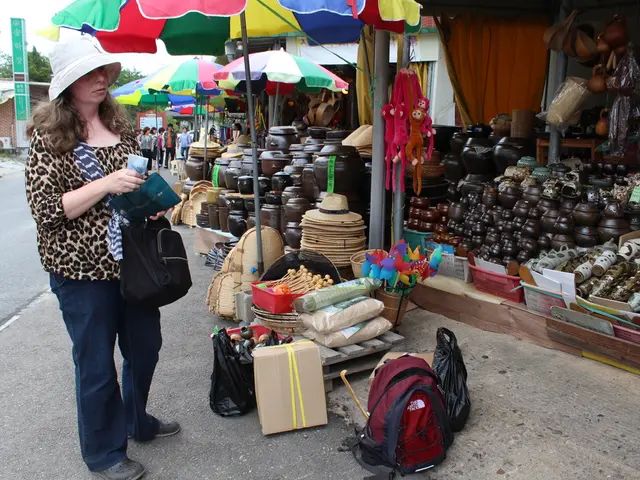South Africa's predicament concerning industrial decline
South Africa, a country rich in natural resources, has been grappling with a host of issues affecting its mining and manufacturing sectors. Over-regulation of labor, environmental regulations, and licensing requirements have taken a toll on the mining industry, while inconsistent electricity supply, underperforming ports and railways, and increasing water disruptions have made domestic mining and manufacturing operations inordinately inefficient and unnecessarily more expensive.
These challenges have had a significant impact on the country's economic growth. For instance, South Africa's manufacturing industry grew by 8.1% in 2000, but contracted by 0.4% in 2024. The manufacturing business confidence index has more than halved from 77 in Q1 2007 to 33 in Q2 2025, indicating a decline in investor confidence.
The mining sector has also seen a decline, with the number of people formally employed in the industry dropping by 30% and the country's share of global gold production falling from a quarter in 1994 to just 3% in 2024. The South African Mining Charter, aimed at promoting Broad-Based Black Economic Empowerment, has faced criticism for hindering investment and operational efficiency.
However, these challenges present an opportunity for South Africa to reassess its trade and investment policies. The US tariff hikes have created global trade volatility, providing South Africa with the opportunity to objectively assess its policies. The US is one of South Africa's main vehicle export markets, making the heightened tariffs by the US President Donald Trump a major risk to the country's automotive sector.
To combat unemployment, particularly among the 45.1% of young people (15-34 years) who are not in employment, education or training, the government is focusing on reindustrialization. Achieving these reforms could make mining and manufacturing lucrative, growing sectors, putting South Africa on the path towards reindustrialisation.
Key policy reforms for South Africa's reindustrialization include regulatory clarity to encourage investment, particularly in exploration and mining activities, addressing labor and ownership rules cautiously, and promoting beneficiation of minerals locally to add economic value beyond extraction.
Infrastructure reforms should prioritize upgrading transport logistics such as roads, railways, and ports to reduce equipment and product movement delays, which cause operational downtime and increased costs in mining. Reliable and affordable energy supply improvements are essential to sustain industrial and mining operations, which currently face energy instability challenges.
Additional recommendations are supply chain modernization through the adoption of digital monitoring and fleet management technologies, investment facilitation to create an enabling environment that attracts financing for critical mineral projects, focusing on critical minerals such as lithium, cobalt, and copper mining, and skill development and inclusivity through education and training initiatives to enhance local workforce capabilities in value-added manufacturing and advanced mining technologies.
BUSISIWE Mavuso, CEO of Business Leadership South Africa, recently wrote about the need for the government to act urgently to mitigate the impact of US tariffs on South Africa's vehicle manufacturing sector. Together, these reforms—streamlining regulation, bolstering infrastructure, fostering investment, digital innovation, and human capital development—are critical for South Africa to reindustrialize effectively, reduce unemployment, and address challenges in its manufacturing and mining sectors.
- The decline in South Africa's mining and manufacturing sectors, due to various challenges, has negatively influenced the country's economic growth.
- The government is focusing on reindustrialization efforts as a means to combat high unemployment rates, particularly among young people.
- Key policy reforms for reindustrialization in South Africa include regulatory clarity for investment, particularly in exploration and mining activities, and the promotion of beneficiation of minerals locally to add economic value.
- Infrastructure reforms, such as upgrading transport logistics and ensuring a reliable and affordable energy supply, are vital for sustaining industrial and mining operations in South Africa.




